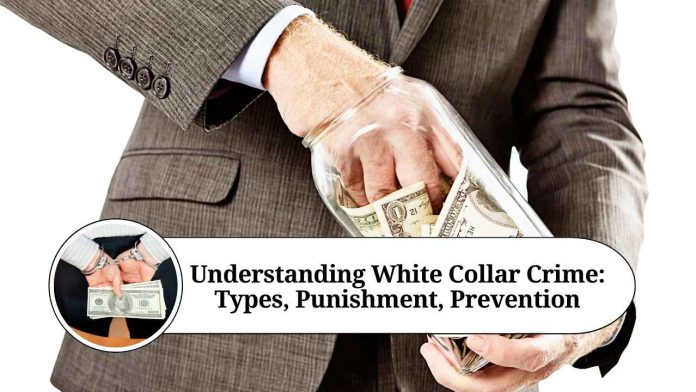White collar crime refers to non-violent criminal offenses committed by individuals or organizations in the course of their professional or business activities. These crimes are typically committed by individuals who hold positions of power or trust and involve financial gain. The Indian Penal Code (IPC) defines several types of white collar crimes and provides for their punishment. In this blog, we will discuss white collar crime under IPC with proper headings.
Definition of White Collar Crime
White collar crime is a term coined by Edwin Sutherland, an American sociologist, in 1939. It refers to crimes that are committed by individuals in their professional or business capacity. White collar crimes are usually non-violent offenses that involve fraud, embezzlement, bribery, insider trading, cybercrime, and other similar activities.
Types of White Collar Crime under IPC
The IPC defines several types of white collar crimes. Some of the most common types of white collar crime under IPC include:
a. Fraud – Fraud refers to the intentional deception of a person or organization for personal gain. Examples of fraud include Ponzi schemes, pyramid schemes, and credit card fraud.
b. Embezzlement – Embezzlement involves the theft of funds or property by an individual who has been entrusted with it. This includes corporate executives who steal money from their companies or government officials who misuse public funds.
c. Bribery – Bribery involves the offering, giving, receiving, or soliciting of something of value in exchange for an improper advantage. Bribery can occur in both the public and private sectors.
d. Insider Trading – Insider trading involves the buying or selling of securities based on non-public information. This is illegal because it gives an unfair advantage to those who have access to the information.
e. Cybercrime – Cybercrime involves the use of computers or the internet to commit illegal activities. This includes hacking, identity theft, and the distribution of malware.
Punishment for White Collar Crime under IPC
The punishment for white collar crime under IPC depends on the specific offense committed. Some offenses are punishable with imprisonment, while others are punishable with fines or both. The punishment may also depend on the amount of money or property involved in the crime.
Prevention of White Collar Crime
Prevention of white collar crime is essential to protect individuals, organizations, and the economy. Some of the ways to prevent white collar crime include:
a. Educating individuals and organizations about the risks of white collar crime.
b. Establishing strong internal controls and oversight to prevent fraud and embezzlement.
c. Conducting background checks on employees and business partners.
d. Enforcing laws and regulations related to white collar crime.
While white collar crime may not involve physical violence, its impact can be just as devastating as violent crime. White collar crimes can cause significant financial losses for individuals, businesses, and governments, and can erode public trust in institutions.
One of the challenges in prosecuting white collar crime is the complexity of the offenses. These crimes often involve sophisticated financial transactions, and the evidence can be difficult to gather and interpret. Additionally, white collar criminals often have access to significant resources and may be able to hire skilled lawyers to defend them.
To address these challenges, law enforcement agencies have developed specialized units to investigate and prosecute white collar crimes. These units often include financial experts, forensic accountants, and computer specialists who can assist in gathering and analyzing evidence.
In addition to criminal prosecution, civil remedies may also be available in cases of white collar crime. For example, individuals and organizations may be able to file lawsuits to recover damages caused by fraud or embezzlement.
Ultimately, preventing white collar crime requires a combination of strong laws and regulations, effective enforcement, and a culture of integrity in business and government. This includes encouraging whistleblowers to come forward and report wrongdoing, as well as promoting transparency and accountability in financial transactions.
Conclusion
In conclusion, white collar crime is a serious problem that can have significant consequences for individuals, businesses, and society as a whole. Understanding the different types of white collar crime, the punishment for these offenses, and the steps that can be taken to prevent them is essential for protecting against these crimes and promoting a culture of honesty and integrity.
Frequently Asked Questions (FAQs)
What is white collar crime?
White collar crime refers to non-violent criminal offenses committed by individuals or organizations in the course of their professional or business activities. These crimes often involve financial gain and may include fraud, embezzlement, bribery, insider trading, and cybercrime.
How is white collar crime punished?
The punishment for white collar crime varies depending on the specific offense committed. Some offenses are punishable with imprisonment, while others are punishable with fines or both. The punishment may also depend on the amount of money or property involved in the crime.
What are some examples of white collar crime?
Some examples of white collar crime include Ponzi schemes, pyramid schemes, credit card fraud, embezzlement, bribery, insider trading, and cybercrime.
Who can commit white collar crime?
White collar crime can be committed by anyone in a position of power or trust, including corporate executives, government officials, and financial professionals.
Why is white collar crime a problem?
White collar crime can cause significant financial losses for individuals, businesses, and governments, and can erode public trust in institutions. These crimes can also have a destabilizing effect on the economy as a whole.
How can white collar crime be prevented?
Prevention of white collar crime requires a combination of strong laws and regulations, effective enforcement, and a culture of integrity in business and government. This includes encouraging whistleblowers to come forward and report wrongdoing, as well as promoting transparency and accountability in financial transactions.
What is the role of law enforcement in preventing white collar crime?
Law enforcement agencies play a critical role in preventing white collar crime by investigating and prosecuting these offenses. Specialized units may be established to investigate and prosecute white collar crimes, and these units often include financial experts, forensic accountants, and computer specialists who can assist in gathering and analyzing evidence.
What are the civil remedies available in cases of white collar crime?
In addition to criminal prosecution, civil remedies may also be available in cases of white collar crime. For example, individuals and organizations may be able to file lawsuits to recover damages caused by fraud or embezzlement.
What is the importance of whistleblowers in preventing white collar crime?
Whistleblowers play a crucial role in preventing white collar crime by coming forward and reporting wrongdoing. Whistleblowers may be protected by law from retaliation, and their reports can help to uncover fraud and other illegal activities.
How can individuals protect themselves from becoming victims of white collar crime?
Individuals can protect themselves from becoming victims of white collar crime by being cautious with their personal and financial information, conducting background checks on business partners and employees, and reporting suspicious activities to law enforcement. Additionally, individuals should be aware of common scams and frauds and take steps to avoid them.




















